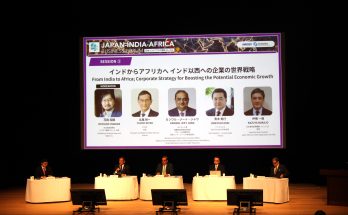Barack Obama has become the first US president to visit Kenya and Ethiopia, two of East Africa’s emerging economies. While there was plenty of buzz and excitement in Kenya about Mr Obama’s visit to his ancestral home, the mood in Ethiopia was more subdued. The trip saw Mr Obama doing a fine balancing act, between conjuring up the huge untapped potential of Africa and doing some plain-speaking on endemic problems in the continent, including corruption, terrorism and the pernicious practice of presidency-for-life.
Mr Obama began his trip to the continent by visiting Kenya first where he met President Uhuru Kenyatta and later addressed a packed gathering of thousands of Kenyans at an indoor stadium.
In Nairobi, he spoke about how Kenya as a fast growing economy needs to tackle corruption and how it could make a difference if the same money went into the pocket of an honest person and said corruption costed nearly 250,000 jobs. He stressed on the importance of democracy and space for citizens to exercise their rights. Against the backdrop of rising extremism in the African continent, the leaders of the US and Kenya vowed to join hands to combat terrorism.
In Addis Ababa, Mr Obama met Ethiopian leaders and even called Ethiopia a democracy despite the controversy surrounding the recent elections where the opposition parties couldn’t even win a single seat in parliament. President Obama urged Ethiopia gently to make room for opposition and stressed on
a host of challenges the country faces.
In his talks with Prime Minister Hailemariam Desalegn, issues like counter terrorism, human rights and regional security issues, including the ongoing humanitarian crisis in South Sudan, figured prominently in the discussions.
The highlight of his visit was an address to the African Union – he became the first sitting American President to address the 54-nation AU – where he spoke in unusually frank manner about the febrile state of democracy in the continent. In particular, he targeted the practice of presidency-for-life that has subjected many African countries to decades to totalitarian rule through cosmetic elections. “Nobody should be president for life,” Mr Obama warned.
“I don’t understand why people want to stay so long, especially when they have got a lot of money,” he told the 54-member AU.
The situation in South Sudan also figured in Mr Obama’s discussions at the AU. South Sudan is facing a deadline by August 17 to accept a peace and power-sharing agreement. Mr Obama discussed contours of an international response if South Sudan fails to reach a deal by the deadline. Ethiopia has partnered with the US in sharing intelligence, fighting terrorism and sending troops to Somalia to address the crisis there.
While Obama’s visit has re-energised relations between the US and both the African countries, there is still a long way to go in addressing many issues and working together to reduce trade imbalance with the overall total trade for US with Africa hovering around USD 85 billion.
Author Profile
- India Writes Network (www.indiawrites.org) is an emerging think tank and a media-publishing company focused on international affairs & the India Story. Centre for Global India Insights is the research arm of India Writes Network. To subscribe to India and the World, write to editor@indiawrites.org. A venture of TGII Media Private Limited, a leading media, publishing and consultancy company, IWN has carved a niche for balanced and exhaustive reporting and analysis of international affairs. Eminent personalities, politicians, diplomats, authors, strategy gurus and news-makers have contributed to India Writes Network, as also “India and the World,” a magazine focused on global affairs.
Latest entries
 DiplomacyJanuary 5, 2026India walks diplomatic tightrope over US operation in Venezuela
DiplomacyJanuary 5, 2026India walks diplomatic tightrope over US operation in Venezuela India and the WorldNovember 26, 2025G20@20: Africa’s Moment – The Once and Future World Order
India and the WorldNovember 26, 2025G20@20: Africa’s Moment – The Once and Future World Order DiplomacyOctober 4, 2025UNGA Resolution 2758 Must Not Be Distorted, One-China Principle Brooks No Challenge
DiplomacyOctober 4, 2025UNGA Resolution 2758 Must Not Be Distorted, One-China Principle Brooks No Challenge India and the WorldJuly 26, 2025MPs, diplomats laud Operation Sindoor, call for national unity to combat Pakistan-sponsored terror
India and the WorldJuly 26, 2025MPs, diplomats laud Operation Sindoor, call for national unity to combat Pakistan-sponsored terror








